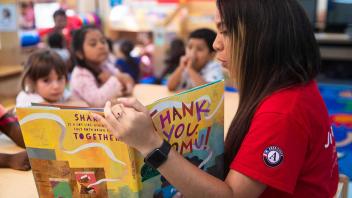If you are a member of a community, religious, or cultural organization, here is a list of simple things your organization can do to help the children in your community become readers.
- Encourage members of your group to volunteer as tutors
Contact literacy programs already in place through local schools, libraries, or other community groups and offer volunteers from your organization to support their work. Offer release time to allow staff to meet with and read to students.
- Start a community reading program
Encourage your members or staff to volunteer as tutors. Provide transportation for children and tutors. Offer your organization’s building as a safe site in which the program can take place.
- Work with preschool children
Donate children’s books to an early childhood center, mothers’ day out program, or parent/child play group. Organize a program in which members volunteer to read to children in these programs each week.
- Sponsor trips to the local library
Help provide transportation or escorts for neighborhood children during weekly trips to the library. Ask whether any children have special transportation needs such as a wheelchair lift and try to link them with an escort who can meet those needs.
- Get families involved in local reading efforts
Parental involvement has a crucial impact on children’s academic achievement. Take information about local reading programs into the school. Encourage families whose children have special needs to participate in local reading efforts.
- Think of ways your organization’s expertise can help make stories come alive for students
By adding music, movement, or improvisation, performers can help students respond to and better understand a story. Develop a weekly storytelling hour at your organization, using your members’ individual talents.
- Help train other volunteers
Work with reading specialists from your school system to obtain training for your volunteers. Request assistance from your school district’s special education office to provide training for volunteers working with students who have learning challenges.
- Help students write their own stories
Also help produce the stories in book or dramatic form. Students may develop more interest in reading the stories of others once they have tried writing themselves. Organize an event for the students to read or perform their written work.
- Hold an essay or speech contest
Ask local children to write about the topic of how “Reading Has Made a Difference in My Life.” These stories can reinforce the benefits of learning to read and help set high reading standards. Offer a small prize related to literacy, such as a reference book or a bookstore gift certificate.
- Cooperate with other organizations and school staff
Rarely can one organization or individual “do it all.” Contact other community organizations that have different expertise from your own. Ask for and offer help to improve and expand your reading activities. Contact other reading programs and school staff for guidance.
- Find quality books to reflect the interests of children in your community
Offer these in the form of book lists or actual books to your local reading program. Offer to supplement the reading with related activities.
Adapted from: Read*Write*Now!: Simple Things You Can Do to Help All Children Read Well and Independently by the End of Third Grade. America Reads Challenge, Read*Write*Now! U.S. Department of Education.
